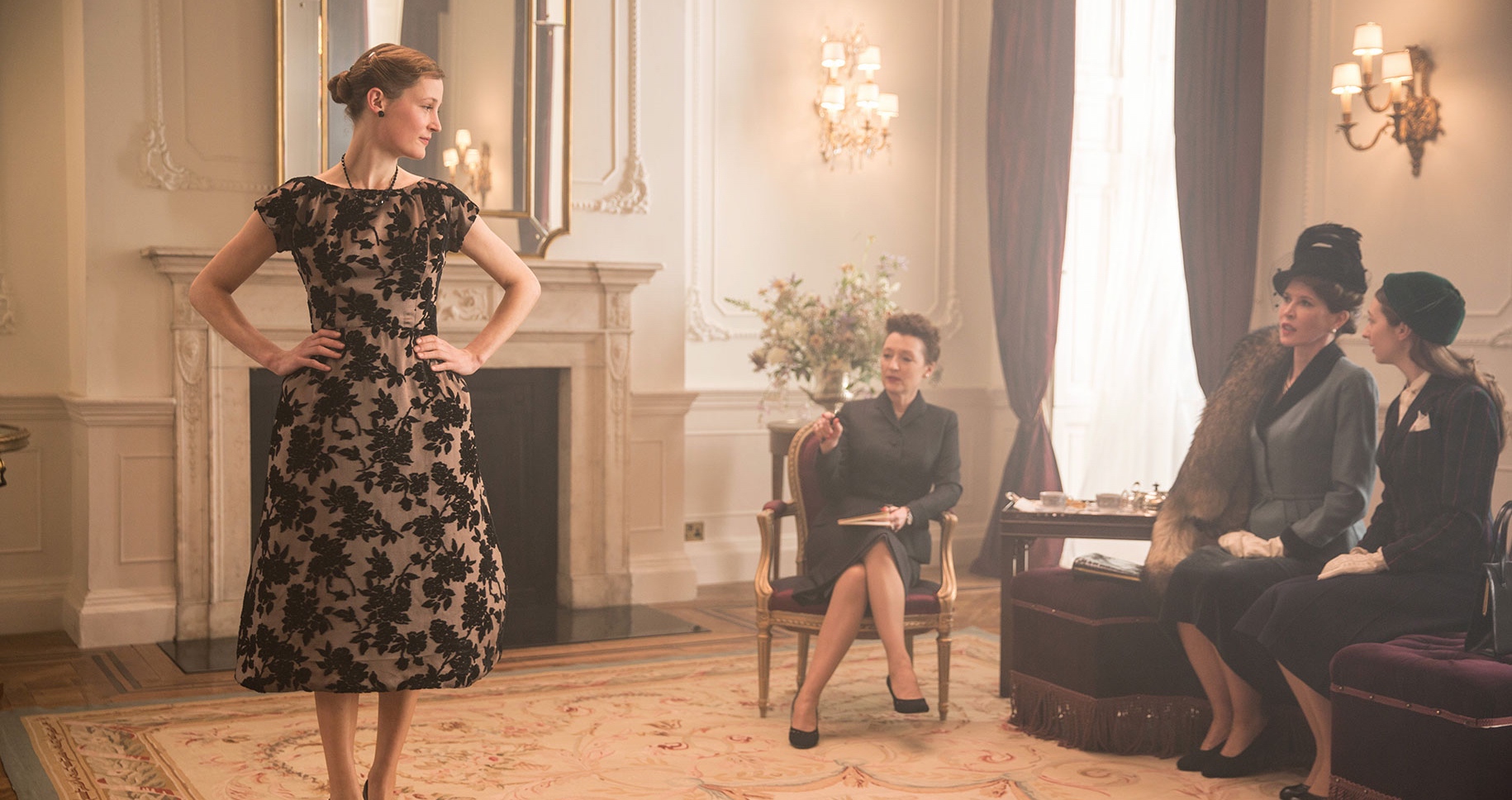Few Americans knew Vicky Krieps before Paul Thomas Anderson’s immediately iconic Phantom Thread was released in December. The thirty-four-year-old Luxembourgian actress had numerous French and German production credits to her name, but the film that boasted drama queen Daniel Day-Lewis’s last performance ever became her breakout project—a strange yin and yang, a simultaneous death and birthing of careers.
Krieps goes up against Day-Lewis with no discernible effort. In Phantom Thread she plays Alma, a young waitress who becomes wife and muse to the masterful dressmaker Reynolds Woodcock (Day-Lewis) in 1950s London. This relationship is characterized by a push and pull; Reynolds (who lives with his sister, played with elegant sass by Lesley Manville) is a Brilliant Artist accustomed to doing things his own way, and when Alma moves in she disrupts his flow with impudent toast-crunching at breakfast. She makes untoward demands on his time and affections—preparing him a romantic meal, in one instance, which Reynolds considers an infringement on his staid routine. To avoid spoilers, I’ll reveal only that Alma eventually figures out how to cut Reynolds down to size.
Onscreen, Krieps is at once formidable and vulnerable. She’s tall for an actress (5’9”) and soft-spoken. Her face is without angles or sharpness; plain but inviting, cheeks often flushed. Paul Thomas Anderson found Krieps in a 2014 German black comedy The Chambermaid Lynn, a film that was available on iTunes for only one week at the time. Somehow, PTA saw it. (Call it kismet.) Even more unbelievable: Krieps first thought she was auditioning for a student film, not realizing PTA was the director attached to Phantom Thread’s script.
In her new film The Young Karl Marx (from director Raoul Peck, of 2016’s I Am Not Your Negro) Krieps plays Jenny von Westphalen, the wife of—you guessed it—a young Karl Marx in mid-1800’s Paris. Strikingly similar to Alma in PT, Jenny criticizes her husband but remains supportive. She dutifully cares for him and their children, even lending a hand in writing the Communist Manifesto. The film is essentially a bromance (between Marx and Friedrich Engels) and primarily features men in rooms talking about politics—so Jenny’s role is small, but crucial. Since she believes in his work, she allows her husband to both be absent and take chances. “Happiness requires rebellion; rebellion against the establishment, the old world,” she tells Engles when he compliments her patience.
Krieps is rebellious, too. She told The Guardian about a “little scandal” she caused upon leaving school in the form of a speech denouncing Luxembourg’s education system. “Thank you for giving me a diploma. You have given me proof that I know how to learn off by heart, that I know how to copy and how to shut my mouth,” she apparently stated. After that, she traveled alone to work in South Africa. More recently, Krieps had the gall to grow irritated with Day-Lewis’s heavy-handed practices; in one of the only Phantom Thread scenes to include improvised dialogue, Alma cooks Reynolds some lovely asparagus he doesn’t appreciate, then tells him exactly what she thinks of all his stuffy rules and pretensions. Krieps has admitted she was sort of speaking to Day-Lewis as herself there, frustrated by his rigid (if famously effective) method acting. Not many have dared to question the man, the myth, the legend. We spoke with Krieps about how Day-Lewis behaved between takes, whether Phantom Thread is a fundamentally romantic story, and how her recent roles have corresponded with the #MeToo movement.
You’ve been acting for years, but Phantom Thread is your star-making, breakout role, at least here in America. What is that like for you to experience at age thirty-four? In Hollywood, a lot of people would say that’s middle-aged.
I never thought of my life in the scheme of a starting point, middle point, ending point. Probably I didn’t grow up like this—I never felt rushed, or like I would have to be at a certain point at a certain age. I don’t see age, for some reason, in people. As you ask me… Now that I think of it, it’s actually perfect. All I can say is, I wouldn’t have wanted to be any younger when I experienced what I’ve experienced with Phantom Thread. I would not have been prepared.
In both The Young Karl Marx and Phantom Thread, you play women who stand up for themselves against powerful and respected men—who also happen to be their husbands. How do you think these women, Alma and Jenny, become important in the stories of two great men?
“It was a time where a woman could live in this almost meditative state of supporting a man.”
Both women are special because they’re strong, but not loud. They’re able to stand in the background—yet be maybe even stronger than the people in the front, getting attention. They’re not seeking recognition or approval. Maybe it’s something that nowadays… I won’t say it’s something that we don’t have anymore—but it’s difficult. Now we can be strong, but we’re expected to be good wives, good mothers, and also very educated, very funny, sensitive, sensible. All the things at once. It’s a lot to be a woman, today. These women didn’t need an explanation from the outside. They didn’t think, “I know I’m a good woman because I have this university degree. And also I’m beautiful. And a good mother.” In the end, that’s what makes them so strong. It’s also stupid to compare, because now…Jenny Marx would’ve had an iPhone. She would’ve probably been much more distracted. It was a time where a woman could live in this almost meditative state of supporting a man.
Do you think that in falling in love with an artist or writer, the cliché holds true that they will always love their art—or their work—more than they’ll love you?
I’ve had this conversation so often in my own life. I’m an actor, and you always have this discussion of “Where’s your love?” It’s not to be solved. It’s both ways. You find compromises.
Why did you read Emily Dickinson’s poetry in preparing for the role of Alma?
I don’t know. I do think that she is very close to Alma. I found [her poems] very powerful—it’s all set in nature, they’re quiet and humble. Her poems are not poems that try to impress by telling you how witty or intelligent the writer is. I was going on my instincts. And with Jenny, I read a lot before shooting Karl Marx. I read the reports of the spies; back in the day, they had lots of spies constantly reporting on Karl Marx because he was a thorn in the eye of every country he was in, of every government. The way these spies described [Jenny]… It’s super interesting, as it’s insight from someone who is watching her from the outside.
 As far as Daniel Day-Lewis famously staying in character at all times, I’m curious: When Paul Thomas Anderson called “cut,” how did it work between takes? If you sneezed, would DDL say “bless you” as himself, or would he still be speaking to you in character like Reynolds, and say “shut up, you’re being too loud!” or something?
As far as Daniel Day-Lewis famously staying in character at all times, I’m curious: When Paul Thomas Anderson called “cut,” how did it work between takes? If you sneezed, would DDL say “bless you” as himself, or would he still be speaking to you in character like Reynolds, and say “shut up, you’re being too loud!” or something?
I think he would certainly say “Bless you,” and it would be as Reynolds. I mean, he doesn’t break character in how he speaks or carries his body. But you are absolutely talking to Daniel—it’s not like he becomes someone completely different. He just stays in that world. It’s like when you’re children and you say, “Let’s play that we’re on the moon.” You can open the door of your house and there’s the postman, and you take the post and close the door—but then you’re back on the moon, and everything’s fine, and the postman was just on the moon but that doesn’t matter. It’s like that.
Phantom Thread is about a partnership, though it’s a somewhat twisted and sadistic one. Do you find the relationship you’ve portrayed, between Alma and Reynolds, to actually be romantic?
“Often something romantic is round and beautiful and flows well. It’s almost too round. Phantom Thread is not round, it’s more square.”
[Laughs] I like the way you ask the question. It sounds like you’re not really sure. I wouldn’t say only romantic. I think Alma, deep inside, is a big romantic. But if I think of the story as a whole, and look at it from the outside, I would use the words “honest” and “mysterious” instead. Which is a contradiction, in a way. The story is full of contradictions, but the contradictions portray the truth, sometimes better than if you put it in a clearer way. Often something romantic is round and beautiful and flows well. It’s almost too round. Phantom Thread is not round, it’s more square.
Is working in the American film industry different from working in Europe?
Where I was lucky is that Phantom Thread was shot in England, with a completely English crew. So I shot an American film, but I didn’t shoot it the American way. Though Paul is, in many ways, very American, once he’s in Europe he is like a chameleon. He adapts to his surroundings, to cultures. When I met him in London, he didn’t seem like an American. That made it easy for me. It didn’t feel so different.
Lots of actors say they can’t watch themselves on screen. I don’t know about The Young Karl Marx, but I know you’ve seen Phantom Thread many times, and you’re in almost every single scene. Does that bother you?
I had to learn it. I was one of those actors—I couldn’t stand to see myself. I still struggle with it. I have the first intuitive feeling I think every person has when you hear your own voice. You think, “What?! Eugh.” When I watch a movie I’m in, I think, “What? That’s a mistake. Why am I there?” Like if you saw your neighbor in a movie or something, you’d say, “What is he doing there?” But then I decided I wanted to learn from seeing myself. It was stupid not to.
You’re not tempted to wish you had done something differently, to critique your performance or how you look?
I have that, too. But it’s learning to tame your voices—that’s what you do for acting as well. The voices in your head that tell you, “You’re shit” or “The scene is not good because of you, you’re not enough, you don’t look like a movie star.”
Do you find these two films fit in with the ongoing #MeToo movement?
Yes, both films somehow fit well. Two women not seeking attention, but having strength from within. I think they both deserve attention—it’s not that as a woman you should stay in the shade of your man. Women are ultimately the stronger of the two [genders], and always have been. Everyone knows this. Look at Africa—the whole country is kind of held together by women. If you take away the women, the society collapses. Women are the carers. They give life. For me, the message of both films is that women can lead, but they don’t need to be seen, and that makes them even stronger. Men often need to be seen, you know? They are strong and need the approval of their strength, some kind of affirmation. They need something so they can say, “Oh, wow, it was really me who cut down this tree.” This is why I find the whole #MeToo discussion interesting. To me, there is no fight; women are strong anyhow. It’s just maybe time for them to realize it themselves. FL







